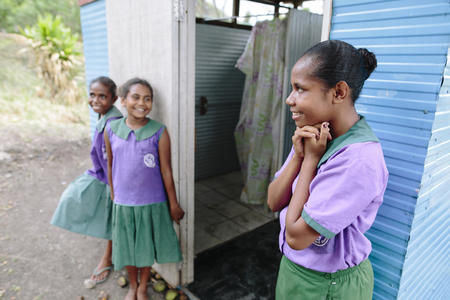How to navigate complex development environments with adaptive programming

Development professionals work in complex, constantly changing environments. How do we learn and adapt in order to navigate them and achieve our mission? David Shaw, Head of Learning and Effectiveness, discusses WaterAid Australia’s new guidelines to an approach that integrates adaptive programming with a theory of change.
Development professionals are increasingly encouraging NGOs to work in adaptive and learning-oriented ways, especially when pursuing a systems strengthening agenda. While there is a growing body of literature calling for the adoption of more flexible, responsive approaches to development practice, comparatively little has been published to practically support this way of working.
Working systems-wide means navigating complexity
Development is a complex process, but often development work is not done in a way that recognises or responds to that complexity.
As part of our systems-wide approach at WaterAid, we seek to transform the national, regional and local systems (including institutions, infrastructure and resources) needed for sustained and equitable water, sanitation and hygiene (WASH) services. To do this, we work with a range of organisations including national and sub-national government, civil society organisations and the private sector, community members, donors and staff. The people in these organisations all have different politics, relationships, education, experiences and incentives that influence how they think and act.
The nature of what we do and the environment we work in is therefore complex.
Our guide to support planning, monitoring, evaluation and learning
Our approach to adaptive programming has evolved over the past five years, on the basis of experimental practice, through applying and adapting different concepts and frameworks to learn what works for us. Recognising the complexity of our work, our handbook A guide to support planning, monitoring, evaluation and learning sets out our approach to adaptive programming. It outlines how we use adaptive programming principles to:
- Plan and design learning-oriented initiatives.
- Monitor progress (both for accountability and learning).
- Manage adaptively in response to change, evidence and opportunity.
The guide is structured around six components that we see as critical to supporting planning, monitoring, evaluating and learning through an adaptive programming approach. We use theory of change to help structure the design and management process, on the basis of an absolute commitment to ongoing context analysis and learning-driven decision making. We have found that developing a theory of change supports a more robust design process. A theory of change identifies key assumptions and provides a point around which adaptations can be made.
A way to better monitor systems strengthening work
We believe this way of thinking and working is ideal for more effective monitoring of systems change, which has been recognised as a key challenge facing systems strengthening work.
We used the guide recently to review the design and monitoring and evaluation frameworks for two projects, funded through DFAT’s Water for Women programme, in Papua New Guinea and Timor-Leste. The review process provided scope to critically reflect on the context and intermediate changes initially identified for project outcomes.
By providing a structure and process to challenge whether assumptions stacked up in light of new evidence, the guide enabled teams to both identify and practically respond to emerging questions. Supporting this flexible, informed response is critical to adaptive programming and ensuring projects remain relevant and effective.
What do you think?
We are open to learning how we can improve our processes and systems to continually enhance how they enable adaptive programming. And we would welcome learning from the experience of others in applying similar approaches to WASH systems strengthening initiatives – or from development programmes more broadly.
Read and download the guidance document in English here >
David Shaw is Head of Learning and Effectiveness at WaterAid Australia @dshaw76
Follow WaterAid’s policy, practice and advocacy on Twitter @WaterAid and WaterAid Australia @WaterAidAustralia




